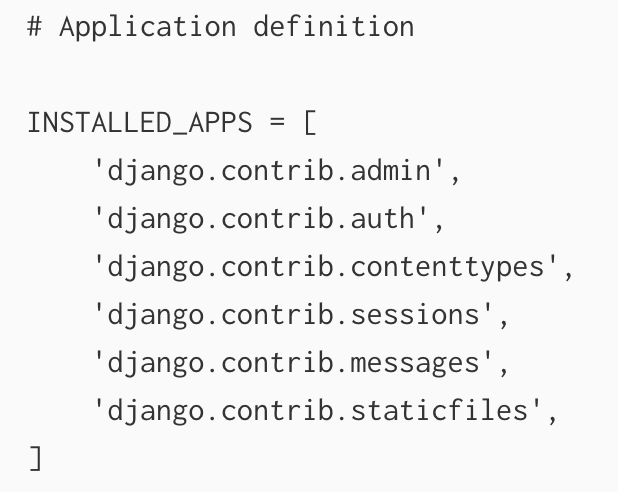1) 장고디렉터리의 구조
django가 실행되면 맨처음은 최초생성된 장고 디렉터리를 바라보게 되어있어요.
제가 만든 django 디렉터리명은 "mynewjangodirec"입니다.
django 서버가 시작되면 mynewjangodirec 디렉터리 하단의 settings.py와 urls.py를 맨처음 참고합니다!
(test_project) marie@MarieJungui-MacBookPro:~/mynewdjango » pwd
/Users/marie/mynewdjango
(test_project) marie@MarieJungui-MacBookPro:~/mynewdjango » tree
.
├── manage.py
└── mynewjangodirec
├── __init__.py
├── asgi.py
├── settings.py
├── urls.py
└── wsgi.py
1 directory, 6 files
(test_project) marie@MarieJungui-MacBookPro:~/mynewdjango »2) 생성된장고디렉터리 상위의 settings.py 살펴보기
(test_project) marie@MarieJungui-MacBookPro:~/mynewdjango » pwd
/Users/marie/mynewdjango
(test_project) marie@MarieJungui-MacBookPro:~/mynewdjango » tree
.
├── manage.py
└── mynewjangodirec
├── __init__.py
├── asgi.py
├── settings.py
├── urls.py
└── wsgi.py
1 directory, 6 files
(test_project) marie@MarieJungui-MacBookPro:~/mynewdjango »
(test_project) marie@MarieJungui-MacBookPro:~/mynewdjango » cat manage.py
#!/usr/bin/env python
"""Django's command-line utility for administrative tasks."""
import os
import sys
def main():
os.environ.setdefault('DJANGO_SETTINGS_MODULE', 'mynewjangodirec.settings')
try:
from django.core.management import execute_from_command_line
except ImportError as exc:
raise ImportError(
"Couldn't import Django. Are you sure it's installed and "
"available on your PYTHONPATH environment variable? Did you "
"forget to activate a virtual environment?"
) from exc
execute_from_command_line(sys.argv)
if __name__ == '__main__':
main()
(test_project) marie@MarieJungui-MacBookPro:~/mynewdjango »3) 생성된장고디렉터리 하단의 settings.py 살펴보기
장고에서 사용되는 APP은 지금보는 settings.py 파일의 "INSTALLED_APPS"라는 리스트 안에 명시되어야 합니다.

그래야 장고에서 해당 APP을 인식하여 쓸 수 있어요.
(test_project) marie@MarieJungui-MacBookPro:~/mynewdjango » pwd
/Users/marie/mynewdjango
(test_project) marie@MarieJungui-MacBookPro:~/mynewdjango »
(test_project) marie@MarieJungui-MacBookPro:~/mynewdjango » tree
.
├── manage.py
└── mynewjangodirec
├── __init__.py
├── asgi.py
├── settings.py
├── urls.py
└── wsgi.py
1 directory, 6 files
(test_project) marie@MarieJungui-MacBookPro:~/mynewdjango »
(test_project) marie@MarieJungui-MacBookPro:~/mynewdjango » cat ./mynewjangodirec/settings.py
"""
Django settings for mynewjangodirec project.
Generated by 'django-admin startproject' using Django 3.0.1.
For more information on this file, see
https://docs.djangoproject.com/en/3.0/topics/settings/
For the full list of settings and their values, see
https://docs.djangoproject.com/en/3.0/ref/settings/
"""
import os
# Build paths inside the project like this: os.path.join(BASE_DIR, ...)
BASE_DIR = os.path.dirname(os.path.dirname(os.path.abspath(__file__)))
# Quick-start development settings - unsuitable for production
# See https://docs.djangoproject.com/en/3.0/howto/deployment/checklist/
# SECURITY WARNING: keep the secret key used in production secret!
SECRET_KEY = 'u8(7%^1zs80hb(93lyxg_+s=+a12b465m^*lk4e$8bar4v&oll'
# SECURITY WARNING: don't run with debug turned on in production!
DEBUG = True
ALLOWED_HOSTS = []
# Application definition
INSTALLED_APPS = [
'django.contrib.admin',
'django.contrib.auth',
'django.contrib.contenttypes',
'django.contrib.sessions',
'django.contrib.messages',
'django.contrib.staticfiles',
]
MIDDLEWARE = [
'django.middleware.security.SecurityMiddleware',
'django.contrib.sessions.middleware.SessionMiddleware',
'django.middleware.common.CommonMiddleware',
'django.middleware.csrf.CsrfViewMiddleware',
'django.contrib.auth.middleware.AuthenticationMiddleware',
'django.contrib.messages.middleware.MessageMiddleware',
'django.middleware.clickjacking.XFrameOptionsMiddleware',
]
ROOT_URLCONF = 'mynewjangodirec.urls'
TEMPLATES = [
{
'BACKEND': 'django.template.backends.django.DjangoTemplates',
'DIRS': [],
'APP_DIRS': True,
'OPTIONS': {
'context_processors': [
'django.template.context_processors.debug',
'django.template.context_processors.request',
'django.contrib.auth.context_processors.auth',
'django.contrib.messages.context_processors.messages',
],
},
},
]
WSGI_APPLICATION = 'mynewjangodirec.wsgi.application'
# Database
# https://docs.djangoproject.com/en/3.0/ref/settings/#databases
DATABASES = {
'default': {
'ENGINE': 'django.db.backends.sqlite3',
'NAME': os.path.join(BASE_DIR, 'db.sqlite3'),
}
}
# Password validation
# https://docs.djangoproject.com/en/3.0/ref/settings/#auth-password-validators
AUTH_PASSWORD_VALIDATORS = [
{
'NAME': 'django.contrib.auth.password_validation.UserAttributeSimilarityValidator',
},
{
'NAME': 'django.contrib.auth.password_validation.MinimumLengthValidator',
},
{
'NAME': 'django.contrib.auth.password_validation.CommonPasswordValidator',
},
{
'NAME': 'django.contrib.auth.password_validation.NumericPasswordValidator',
},
]
# Internationalization
# https://docs.djangoproject.com/en/3.0/topics/i18n/
LANGUAGE_CODE = 'en-us'
TIME_ZONE = 'UTC'
USE_I18N = True
USE_L10N = True
USE_TZ = True
# Static files (CSS, JavaScript, Images)
# https://docs.djangoproject.com/en/3.0/howto/static-files/
STATIC_URL = '/static/'
(test_project) marie@MarieJungui-MacBookPro:~/mynewdjango »4) 생성한 장고디렉터리 하단의 urls.py 살펴보기
(test_project) marie@MarieJungui-MacBookPro:~/mynewdjango » pwd
/Users/marie/mynewdjango
(test_project) marie@MarieJungui-MacBookPro:~/mynewdjango » tree
.
├── manage.py
└── mynewjangodirec
├── __init__.py
├── asgi.py
├── settings.py
├── urls.py
└── wsgi.py
1 directory, 6 files
(test_project) marie@MarieJungui-MacBookPro:~/mynewdjango »
(test_project) marie@MarieJungui-MacBookPro:~/mynewdjango » cat ./mynewjangodirec/urls.py
"""mynewjangodirec URL Configuration
The `urlpatterns` list routes URLs to views. For more information please see:
https://docs.djangoproject.com/en/3.0/topics/http/urls/
Examples:
Function views
1. Add an import: from my_app import views
2. Add a URL to urlpatterns: path('', views.home, name='home')
Class-based views
1. Add an import: from other_app.views import Home
2. Add a URL to urlpatterns: path('', Home.as_view(), name='home')
Including another URLconf
1. Import the include() function: from django.urls import include, path
2. Add a URL to urlpatterns: path('blog/', include('blog.urls'))
"""
from django.contrib import admin
from django.urls import path
urlpatterns = [
path('admin/', admin.site.urls),
]
(test_project) marie@MarieJungui-MacBookPro:~/mynewdjango »5) 생성한 장고디렉터리 하단의 init.py
(test_project) marie@MarieJungui-MacBookPro:~/mynewdjango » pwd
/Users/marie/mynewdjango
(test_project) marie@MarieJungui-MacBookPro:~/mynewdjango » tree
.
├── manage.py
└── mynewjangodirec
├── __init__.py
├── asgi.py
├── settings.py
├── urls.py
└── wsgi.py
1 directory, 6 files
(test_project) marie@MarieJungui-MacBookPro:~/mynewdjango »
(test_project) marie@MarieJungui-MacBookPro:~/mynewdjango » cat ./mynewjangodirec/__init__.py
(test_project) marie@MarieJungui-MacBookPro:~/mynewdjango »6) 생성한 장고디렉터리 하단의 asgi.py
(test_project) marie@MarieJungui-MacBookPro:~/mynewdjango » pwd 127 ↵
/Users/marie/mynewdjango
(test_project) marie@MarieJungui-MacBookPro:~/mynewdjango » tree
.
├── manage.py
└── mynewjangodirec
├── __init__.py
├── asgi.py
├── settings.py
├── urls.py
└── wsgi.py
1 directory, 6 files
(test_project) marie@MarieJungui-MacBookPro:~/mynewdjango »
(test_project) marie@MarieJungui-MacBookPro:~/mynewdjango » cat ./mynewjangodirec/asgi.py
"""
ASGI config for mynewjangodirec project.
It exposes the ASGI callable as a module-level variable named ``application``.
For more information on this file, see
https://docs.djangoproject.com/en/3.0/howto/deployment/asgi/
"""
import os
from django.core.asgi import get_asgi_application
os.environ.setdefault('DJANGO_SETTINGS_MODULE', 'mynewjangodirec.settings')
application = get_asgi_application()
(test_project) marie@MarieJungui-MacBookPro:~/mynewdjango »7) 생성한 장고디렉터리 하단의 wsgi.py
(test_project) marie@MarieJungui-MacBookPro:~/mynewdjango » pwd
/Users/marie/mynewdjango
(test_project) marie@MarieJungui-MacBookPro:~/mynewdjango » tree
.
├── manage.py
└── mynewjangodirec
├── __init__.py
├── asgi.py
├── settings.py
├── urls.py
└── wsgi.py
1 directory, 6 files
(test_project) marie@MarieJungui-MacBookPro:~/mynewdjango »
(test_project) marie@MarieJungui-MacBookPro:~/mynewdjango » cat ./mynewjangodirec/wsgi.py
"""
WSGI config for mynewjangodirec project.
It exposes the WSGI callable as a module-level variable named ``application``.
For more information on this file, see
https://docs.djangoproject.com/en/3.0/howto/deployment/wsgi/
"""
import os
from django.core.wsgi import get_wsgi_application
os.environ.setdefault('DJANGO_SETTINGS_MODULE', 'mynewjangodirec.settings')
application = get_wsgi_application()
(test_project) marie@MarieJungui-MacBookPro:~/mynewdjango »